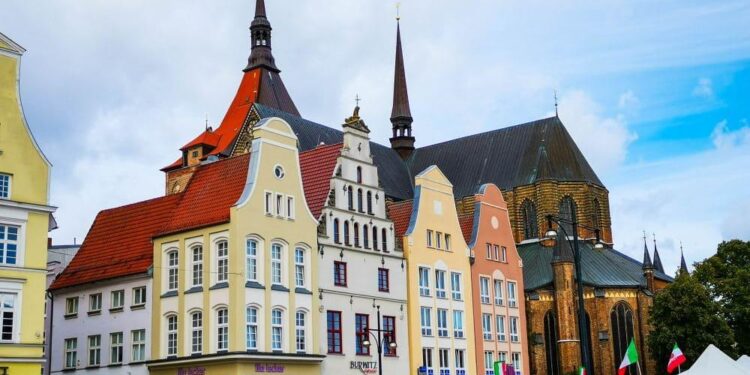Germany’s Rostock government has officially broken ground on a new data center project, marking a significant step forward in the region’s digital infrastructure development. The initiative, aimed at boosting data storage capacity and supporting the growing demand for cloud services, underscores Rostock’s commitment to positioning itself as a key player in Germany’s expanding tech landscape. As data centers become increasingly critical to economic growth and digital transformation, this development signals important progress in the country’s efforts to enhance its technological capabilities.
Germany’s Rostock Government Initiates Major Data Center Project to Boost Regional Digital Infrastructure
The Rostock government has officially commenced construction on a cutting-edge data center, marking a significant step toward enhancing the digital backbone of the Baltic Sea region. This facility is designed to accommodate a rapidly growing demand for cloud services, big data analytics, and edge computing solutions, reflecting Germany’s commitment to sustainable and efficient IT infrastructure. The project, backed by both public and private sectors, is projected to generate hundreds of jobs during its construction phase and beyond, stimulating local economies and creating new technological hubs.
Key features of the data center include:
- Energy-efficient cooling systems utilizing the nearby Baltic Sea water
- State-of-the-art security protocols adhering to GDPR and German data regulations
- Scalable modular design enabling future expansions
- Integration with renewable energy sources to minimize carbon footprint
| Project Aspect | Details |
|---|---|
| Location | Rostock, Germany |
| Estimated Capacity | 10 MW IT load |
| Completion Date | Q4 2025 |
| Investment | ‚ā¨75 million |
Advanced Sustainability Measures Set to Define Rostock’s New Data Center Development
Rostock’s upcoming data center project is charting new territory with its ambitious approach to sustainability. Developers have integrated a suite of cutting-edge environmental technologies aimed at minimizing the facility’s carbon footprint. Among these innovations are advanced energy recovery systems that reuse waste heat to warm nearby residential and commercial spaces, significantly reducing overall energy waste. Additionally, the data center will leverage a sophisticated on-site renewable energy microgrid, which combines solar panels with battery storage to enhance energy autonomy and resilience.
Key sustainability features include:
- Passive cooling solutions utilizing the Baltic Sea’s natural temperature
- LED and sensor-controlled lighting to drastically decrease electricity consumption
- Use of recycled construction materials with minimal embodied carbon
- Smart water management systems to optimize cooling water use and reduce waste
These measures position the Rostock data center as a benchmark for eco-friendly infrastructure in the ICT sector. The project’s design prioritizes not only operational efficiency but also long-term environmental stewardship, setting new standards in Germany and across Europe.
| Measure | Expected Impact | Implementation Timeline |
|---|---|---|
| On-site Renewable Microgrid | 40% reduction in grid electricity use | Q3 2025 |
| Waste Heat Recovery | Supplying 500 households with district heating | Q1 2026 |
| Passive Cooling System | 35% cut in cooling energy demand | Q2 2025 |
Experts Recommend Enhanced Cybersecurity Protocols for Government-Backed Data Facilities
In light of recent technological advancements and the critical nature of government-backed data centers, cybersecurity experts are urging for stringent protocols to be integrated from the ground up. As Germany’s Rostock facility prepares to become a pivotal hub for sensitive data storage, industry leaders emphasize the necessity of multi-layered defense mechanisms, including advanced encryption standards, real-time threat monitoring, and AI-driven anomaly detection. These measures aim not only to protect against external breaches but also to safeguard against insider threats, which have surged in recent years.
To further illustrate the key cybersecurity priorities recommended for such facilities, the following table summarizes the core components that experts deem essential for ensuring resilience and data integrity:
| Security Component | Primary Purpose | Recommended Implementation |
|---|---|---|
| Data Encryption | Protect data both at rest and in transit | 256-bit AES encryption with regular key rotation |
| Access Controls | Limit data access to authorized personnel | Multi-factor authentication (MFA) with biometric verification |
| AI Threat Detection | Identify anomalies and suspicious activity in real time | Machine learning models continuously trained on evolving threats |
Government stakeholders are urged to prioritize these enhanced cybersecurity strategies, pairing robust physical security with digital safeguards. Incorporation of such protocols is expected to set a new benchmark for data protection in public sector infrastructure, ensuring sensitive governmental data withstands increasingly sophisticated cyber threats.
The Conclusion
The groundbreaking of Germany’s new data center in Rostock marks a significant milestone in the region’s digital infrastructure development. Spearheaded by the local government, the project underscores a growing commitment to enhancing data capacity and supporting the expanding needs of cloud services, industry, and public sector operations. As construction progresses, industry observers will be watching closely to see how this initiative shapes the broader landscape of Germany’s data economy and its position within the European digital ecosystem.
















